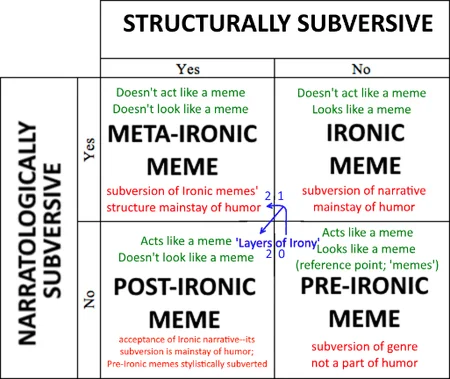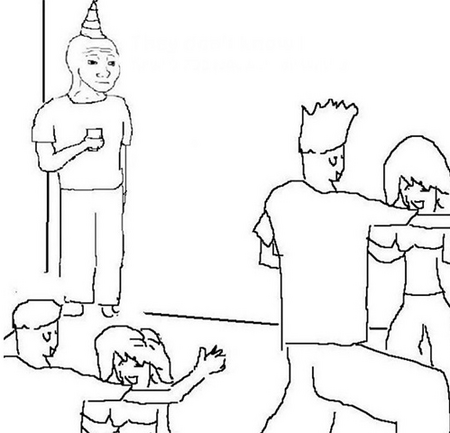
"Niching Down" - The Illusion of Counterculture
First published: Monday October 16th, 2023
Report this blog
What's Funny? (Part 2!)
Think about what's funny for a second. Not to the extent I did beforehand, but simply think about the most widespread form of humor on the internet and social media. I'd argue that meme culture and sarcasm have shifted from pre-irony and irony to post-irony and meta-irony. Essentially pre-irony and irony are used to be funny; both pre-irony and irony are used with a joking intention. However, irony subverts the audience by pretending to be a lie.
Post-irony and meta-irony have emerged recently as the two driving forces of online humor. What's interesting about these two forms of humor is that they aren't supposed to look like jokes, and that's what makes them funny.

Now, it's all good and well that we understand how people make jokes, but the why is, to me, more interesting. Note that the reason we find post and meta-irony funny is because they involve the subversion of humor. Don't you think it's interesting that we find the absence of humor funny? I'd argue that this is a microcosm of a phenomenon I'd call "niching down."
The Emergence of Niching Down
With the rise of TikTok, Instagram, Twitter, and other forms of social media, we find ourselves at a moment in time in which everything we do is scrutinized; the interconnectedness of social media is an eagle-eyed onlooker waiting to praise or pounce upon the concerned party. And since we know that humor is society, not only are we being scrutinized, but we're also being joked about.
Let's look at an example of this. The term "NPC" (meaning Non-Playable Character) has become popularized on TikTok, Instagram, and just general internet humor. The joke derives from NPCs in video games, which are characters that the player interacts with but cannot control; usually, these characters are programmed with pre-set actions and dialogue lines. Essentially, an NPC, when used as a joke, is a person who's deemed to lack any depth or uniqueness to their personality.
There are other terms like "Filmbro," which poke fun at the movie watcher who has watched "surface-level" films like Fight Club, Whiplash, Pulp Fiction, Taxi Driver, etc, and thinks they are peak cinema.
On the opposite end of the spectrum, there's the term "yapping," which I used in my last blog post. It's used to make fun of someone who rambles on and on, insinuating that they're "speaking just to speak" or "yapping." However, often, "yapping," especially on TikTok, is used when anyone makes an in-depth analysis of a topic or speaks on an idea in a nuanced manner. Generally, it is used to make fun of people who have a deep interest in a topic and look to express that interest. The term also speaks to copious anti-intellectualism, but that's a topic for another day.
Now, you could say that I'm over-analyzing this. You could say that I'm taking things too seriously. You could even say that I'm yapping. All of those are fair assessments. But I'd also implore you to look at the similarities between the kinds of dialogue, slang, and overall attitude that social media cultivates.
With the "peanut gallery" that is social media always looming large over our day-to-day internet interactions, we're forced to be wary of every opinion or action we take. If we're deemed too basic we risk becoming NPCs, yet if we're too invested in the things we love, we're cringy and "yapping."

Thus, this is where niching down has emerged into the larger scope of internet culture. We can't be too surface level in fear of being an NPC, but we also can't be too invested, lest we fear being cringy.
How to Niche Down
The forms of social media we have today are starkly different from how they were in the early to mid-2000s. The main difference lies within the uber-precision of algorithms. Social media, TikTok especially, have become masters at sifting through content to find exactly what each user likes. With the algorithm's precision, creators must deconstruct every part of their personality into a box or niche and cater their content to viewers with the same taglines. It's essentially like creating an epithet out of a person.
Thus, we're boxed in from multiple sides. On one side, we need to create a unique and engaging personality. However, on the other side, we cannot create an identity that is too in-depth or too focused on our interests out of fear of not following the norm, being cringy, etc. (I should also add that when too many people create a niche community of the same interests, they too will get "memed" and become an NPC; NPCs can be both surface level or too in-depth). Finally, the algorithm provides a third side, in which you are shown your most in-depth interests; however, that also means you've been "figured out."
So, to niche down properly, you must create a personality that is in-depth enough to avoid being a surface-level NPC but not too in-depth so that you can stay trendy and not be viewed as cringe. For example, I'm not someone who blogs on JetPunk, but rather, I'm a niche internet microcelebrity who writes silly little blogs on a geography-themed website. And I'm not on this website because I'm a geography nerd (that would be too cringy). I'm here because someone showed me this website as an easy way to pass the time during class.
For the Bit
Circling back to my first point about humor, you can see how this phenomenon bleeds into our generation's (mainly Gen Z, but could also apply to millennials or Gen X) internet and real-life personalities. Due to our hyperawareness of the ever-vigilant eyes of social media, we have to loudly proclaim that anything we do that goes against the grain is done post-ironically.
If you have a little running gag or do something that could be considered cringy, it's fine as long as you're doing it "for the bit." For those unaware, the bit is simply something you do ironically or as a joke; it can range from something as small as a running gag to a huge scene/event. Or, as an alternative, you could say you're being "camp" or "campy" to mean that what you're doing is purposefully exaggerated.
If you'd like to take aspects of your personality and compartmentalize them in a way that speaks to your interests without being cringy or over-the-top, you could say that you're "coded." Essentially, it means that you typify something or someone. A common use of the phrase I hear jokingly is that someone is so "Lana Del Ray-coded." Once again, it's a phrase used in jest to mock the absurdity of one's personality or lifestyle. (Note that all of these are forms of humor that are subverted as jokes; the substance of the joke is genuine but the point is the audience can't tell whether it's true).
Another form of "coded" is the word "core." Core is a suffix attached to a genre to create an even more precise subgenre. It is also used to denote oneself as a member of that subgenre. For example, bloke-core is an ironic group based around the average middle-aged "bloke" who always wears football kits (I promise I'm an American, I'm just in London so I have to respect their culture), drinks Stellas, and shouts obscenities at their television when their favorite club concedes in the 63rd minute of a Carabao Cup match against Leeds.

Bloke-core was fully realized as a fashion trend in which people would dress up in throwback football kits to mimic the outfit of a typical "bloke." Out of bloke-core came "nichetoks," a meme subsection of TikTok that combined elements of British culture with soccer clips. Usually, it was just a TikTok that included random clips of various soccer matches, clips from British shows like Inbetweeners (or just general British meme culture), and random memes. Nichetoks became even more niche when TikTok accounts started making nichetoks specific to certain football clubs rather than just football wholistically.
Remember how I said that we love meta-irony? Well, TikTok got so meta that they literally created a trend called corecore. Corecore TikToks usually consist of clips from television, movies, social media, etc, spliced together to comment on some portion of society and invoke the wanted emotion. So a "hopecore" TikTok would involve clips that would invoke a sense of hope in humanity. At first, corecore started as a way of commenting on our generation's overconsumption of media.
Am I the only one who sees how absurd this is becoming? Our generation is so worried about being deemed as cringy that the only form of commenting on our overstimulation and overconsumption of media was diluted into niches.
The Illusion of Counterculture
There's a belief that Gen Z is "alternative" because we love to go against the grain (or because some of us listen to The Smiths or something). But honestly, are we a generation of counterculture, or do we hide our attempts at uniqueness and quirks under the guise of self-aware irony? I don't hate my generation. I quite like it. This blog was not intended for me to come across as a boomer. I just worry that our personalities will continue to be diluted as the interconnectedness and scrutinization of social media roars on. I guess we just need to remember to be quirky because we are quirky. Do it in a genuine manner rather than a post-ironic manner. You don't have to be the guy standing in the corner of the party; even he has his group.

I'll be honest, I have never heard the term "core" used in casual conversation (and I say that as a Gen-Zer), but it was quite interesting to read about nonetheless.
Kind of just like you said, that's part of the trap. At the end of the day, it's hard to escape someone not liking you for really minor reasons. The fact that we have to find some sort of middle ground between being overly nerdy and passionate about a certain topic to a point that it gets annoying and having no interests or unique quirks at all is just ridiculous. We should all be able to love the things that we love without being judged for it, and it's unfortunate that this is a part of our culture, as I don't quite care for it.
Once again, amazing blog! (I'm glad to feel kinda validated by it, too :)
An extrapolation of this term is putting "Tok" at the end of something to label which subgenre of TikTok you're on. Like if I get a lot of sports videos, I'd be on "sportstok" or if I get a lot of movie videos, I'd be on "filmtok."
The overall point here being that we're being forced to break ourselves into niches to make the things we like seem cool. And while it's funny to have this sort of nonchalant, quirky, ironic outlook on life, we really do have to remember to enjoy the things we like doing to the fullest extent.
I shudder to imagine of what new forms of irony and meta-irony will be invented by the generation which comes after Gen Z.
I understand why we joke the way we joke (the use of bits, and nonchalance, and irony, etc.) but I worry that it's getting to a point where it's diluting our personality.
As for post-Gen Z irony, it is going to be insane when Gen X gets older and instead of Gen Z making fun of millennials it will be Gen X making fun of us. If we want to get really "philosophical" it could be argued that millennials are largely typified through nihilism caused by the boomer generation and Gen Z are absurdists who have branched off from nihilism to find an ironic sense of purpose in life out of seemingly "nothing." That's probably why we're so post-ironic and meta-ironic.